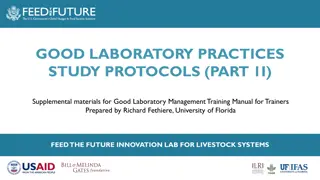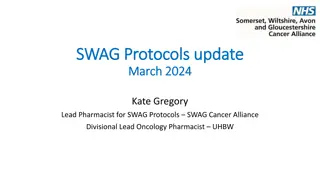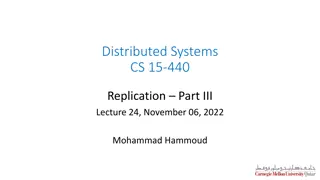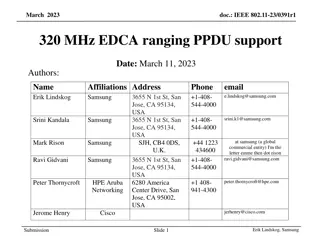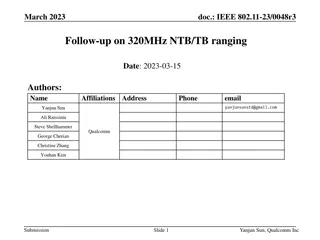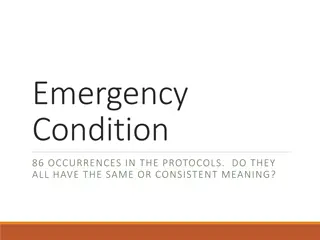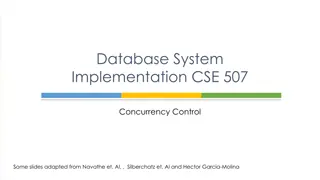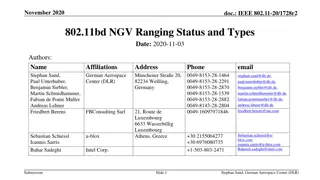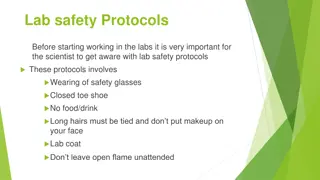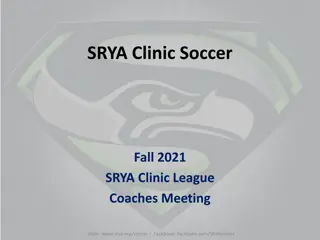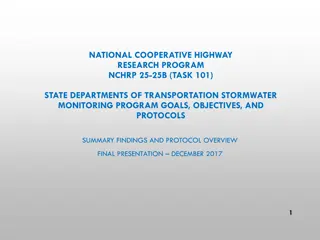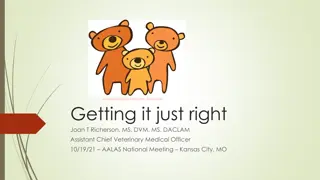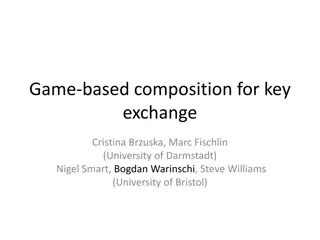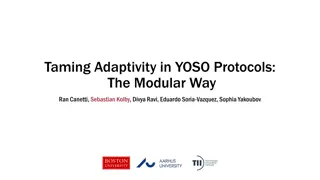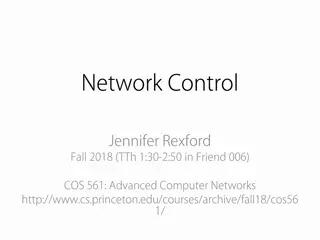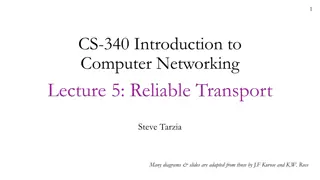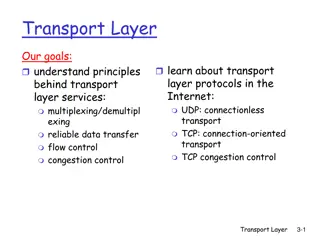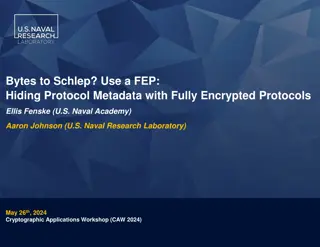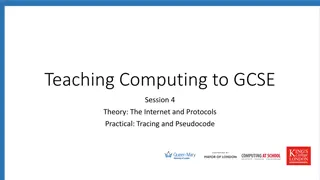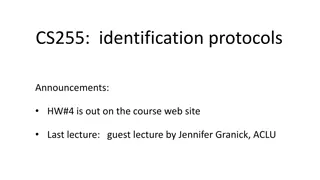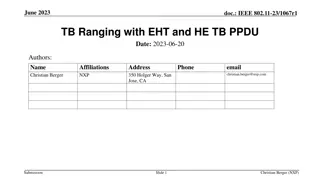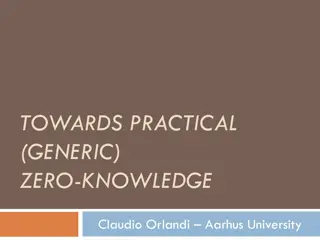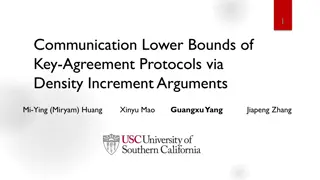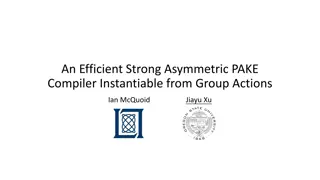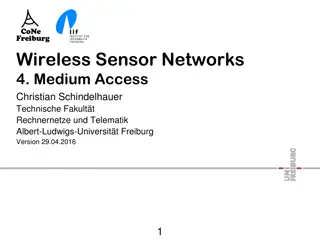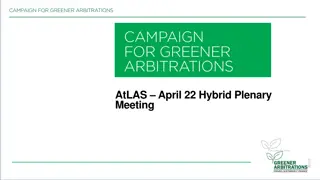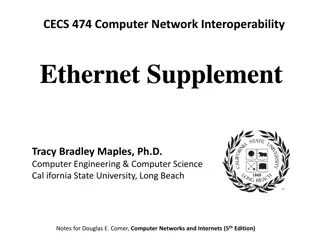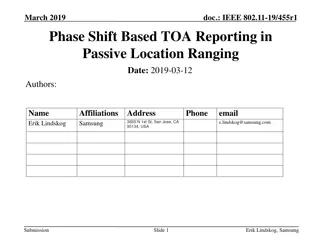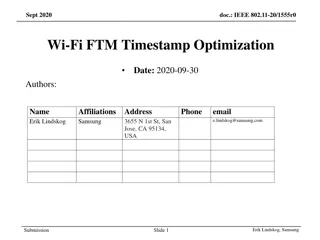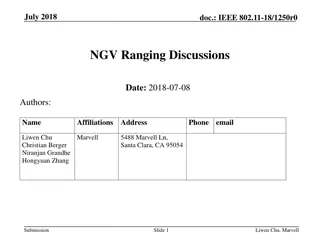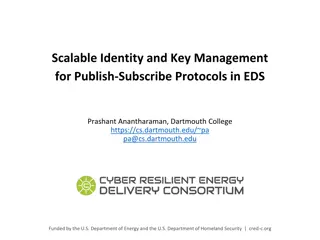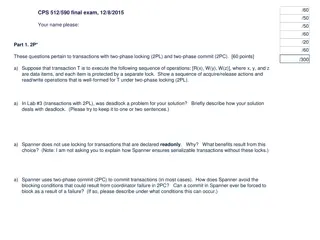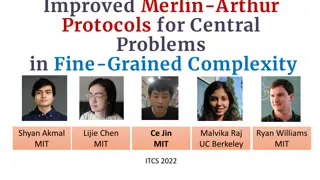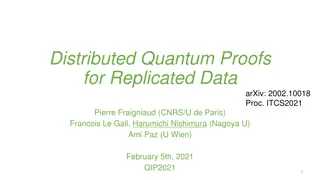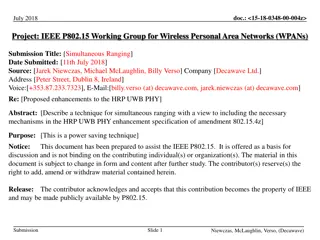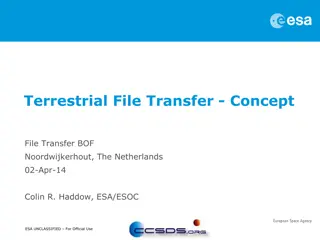Good Laboratory Practices Study Protocols for Effective Research Management
Supplemental materials providing detailed protocols for implementing Good Laboratory Practices (GLP) in research settings. The protocols cover GLP requirements, experimental design, reading regulatory sections, approval processes, amendments, circulation lists, and study plans. These materials aim t
0 views • 22 slides
Update on SWAG Protocols and New NICE TA Progress Report
Kate Gregory leads the SWAG Protocols update for March 2024, with advancements in new protocols and NICE TA updates. A comparison of activities from Oct 2023 to Mar 2024 shows progress in issuing, reviewing, and drafting protocols. The latest NICE TA additions include treatments for advanced cancers
5 views • 13 slides
Understanding Consistency Protocols in Distributed Systems
Today's lecture covers consistency protocols in distributed systems, focusing on primary-based protocols and replicated-write protocols. These protocols play a crucial role in ensuring consistency across multiple replicas. One example discussed is the Remote-Write Protocol, which enforces strict con
0 views • 35 slides
Oklahoma School Safety Protocols Overview
Overview of the school safety protocols in Oklahoma, which define requirements based on COVID-19 alert levels per capita in each county. The protocols include instructions for different alert levels, mask recommendations, visitor limitations, and activity guidelines. Schools are expected to offer in
0 views • 9 slides
Proposal for EHT 320 MHz PPDU Support in EDCA Ranging for IEEE 802.11-23/0391r1
The document outlines a proposal to enable EHT 320 MHz PPDU support for EDCA ranging in IEEE 802.11-23/0391r1. It discusses the implementation of FTM legacy ranging, the importance of wider bandwidths, and the necessary changes in the standard to incorporate this support. The proposal aims to enhanc
0 views • 6 slides
IEEE 802.11 Proposal for 320MHz Ranging Enhancement
This document discusses the proposal for enhancing IEEE 802.11 with support for 320MHz bandwidth ranging operations. It aims to improve ranging accuracy by expanding 802.11az frames and procedures to accommodate the increased bandwidth. The focus is on MAC-related changes, exploring different option
2 views • 26 slides
Work Protocols and Safety Measures for Employees Returning to Work
In the wake of the COVID-19 pandemic, these work protocols emphasize roles, responsibilities, and mental wellbeing of employees. Pre-work precautions at home, personal measures, testing procedures, increasing awareness, and safe travel guidelines are highlighted to ensure a secure work environment.
0 views • 16 slides
Understanding Emergency Conditions in ERCOT Protocols
ERCOT has defined various levels and communication protocols for Emergency Conditions within the electrical grid system. This includes Emergency Notices, Energy Emergency Alerts, operating plans, outage coordination, and requirements related to voltage support for ensuring system safety and reliabil
6 views • 18 slides
Understanding Lock-Based Protocols in Database Concurrency Control
Lock-based protocols are essential mechanisms for controlling concurrent access to data items in a database system. This involves granting locks in exclusive (X) or shared (S) modes to ensure data integrity and prevent conflicts. Lock compatibility matrices and locking protocols play a crucial role
2 views • 69 slides
IEEE 802.11-20/1728r2 NGV Ranging Contributions
Review of contributions on ranging for IEEE 802.11bd NGV, highlighting different ranging types and protocols discussed. Various use cases, performance results, and considerations on ranging methods for NGV are explored in the document.
0 views • 17 slides
Laboratory Safety Protocols and Pathogen Classification
Scientist must adhere to lab safety protocols including wearing safety gear, proper waste disposal, and handling chemicals carefully. The classification of pathogens varies by country based on WHO guidelines into four risk groups. Understanding these protocols and classifications is crucial for a sa
0 views • 17 slides
IEEE 802.11-20/1761r1 Ranging Protocol for 11bd
This document outlines the ranging protocol proposed for IEEE 802.11-20/1761r1, focusing on RTT-based ranging leveraging multi-channel operation. By integrating the 11az ranging protocol, it enables flexible and low-overhead application in 11bd for improved accuracy in ITS bands. The protocol includ
1 views • 13 slides
SRYA Clinic Soccer Fall 2021 Updates and Protocols
Stay updated on the latest news and protocols for the SRYA Clinic Soccer Fall 2021 season. Learn about volunteer positions, contacts, fun facts about the program, COVID-19 updates, and general protocols from Rec & Parks. Ensure the safety and well-being of players, coaches, and families while enjoyi
0 views • 23 slides
State Transportation Department's Stormwater Monitoring Program Overview
This document presents findings and protocols from the National Cooperative Highway Research Program related to stormwater monitoring goals, objectives, and protocols for state departments of transportation. The project team, objectives, and report organization are outlined, aiming to provide guidan
0 views • 32 slides
Animal Use Protocols: Finding the Right Balance
Exploring the analogy between the story of the three bears and animal use protocols, this content delves into the importance of providing just the right amount of information in research protocols. Through examples of intravenous injections in mice, the text emphasizes the necessity of striking the
0 views • 8 slides
Secure Composition of Key Exchange Protocols
Explore the game-based composition approach for key exchange protocols, focusing on ensuring security in compositions with arbitrary tasks and the universal composability of protocols. Delve into the Bellare-Rogaway security model and the details of security games in protocol analysis. Understand ke
0 views • 25 slides
Taming Adaptivity in YOSO Protocols: The Modular Way
Explore the concept of taming adaptivity in YOSO protocols through a modular approach. The research delves into the efficiency, adversary adaptivity, role assignments, and compiler models in synchronous YOSO protocols. The visual presentations illustrate the framework, challenges, and strategies in
0 views • 19 slides
Network Routing Algorithms and Protocols Overview
Understanding network routing algorithms and protocols is crucial in the field of networking. This content provides insights into the initialization process, loop prevention mechanisms, and the use of algorithms like OSPF and IS-IS. It also touches on routing protocols such as RIP and EIGRP, explain
0 views • 17 slides
Understanding Reliable Transport and User Datagram Protocol in Computer Networking
This content covers the concepts of reliable transport in computer networking, including the reliable transport layer protocols like TCP, UDP, and the basics of Domain Name Service (DNS). It explains the layers of the Internet, the functions of each layer, and the differences between TCP and UDP pro
0 views • 28 slides
Understanding Internet Transport Layer Services and Protocols
In the realm of networking, exploring the principles of transport layer services is crucial. This involves concepts like multiplexing/demultiplexing, reliable data transfer, flow control, and congestion control, which are facilitated by protocols such as UDP and TCP. The transport layer acts as a br
0 views • 56 slides
Securing Protocols with Fully Encrypted Protocols (FEPs)
In this research presented at the Cryptographic Applications Workshop, Ellis Fenske and Aaron Johnson address the challenges of Fully Encrypted Protocols (FEPs). They highlight the lack of precise understanding, formalized goals, and proven security in existing FEPs. The work introduces new security
0 views • 29 slides
Comprehensive Overview of Computer Networks and Protocols for GCSE Level
Explore the diverse aspects of computer networks and protocols through in-depth discussions on LAN, WAN, client-server relationships, hardware requirements, network topologies, protocols like TCP/IP and HTTP, and the significance of network layers. Understand the roles, benefits, and risks associate
0 views • 23 slides
Overview of Identification Protocols in CS255 by Dan Boneh
The lecture in CS255 covers various topics related to identification protocols, including signatures from trapdoor functions, certificates, revocation methods, certificate issuance problems, defense mechanisms like certificate transparency (CT), and moving on to protocols. The talk also explores the
0 views • 43 slides
IEEE 802.11-23/1067r1 TB Ranging with EHT and HE TB PPDU Overview
This document discusses the use of 320 MHz bandwidth in TB ranging for IEEE 802.11-23/1067r1, focusing on EHT and HE TB frames. It examines the decision trees regarding the use of EHT TB ranging NDP, limitations on frame mixing, and bandwidth reduction for Location Measurement Report (LMR). Key cons
0 views • 8 slides
Towards Practical Generic Zero-Knowledge Protocols
Exploring the evolution of zero-knowledge protocols, this presentation by Claudio Orlandi from Aarhus University delves into the concepts of Zero-Knowledge from Garbled Circuits, Privacy-Free Garbled Circuits, and more. The talk discusses efficient methods for proving statements and touches on relat
0 views • 29 slides
Enhanced Cleaning Protocols for Classrooms and Common Areas
Spread through respiratory droplets, COVID-19 requires rigorous cleaning protocols in class and common areas. Key measures include mandatory mask-wearing, hand sanitizing, physical distancing, and regular surface cleaning using alcohol wipes and disinfectants. Classroom staff play a crucial role in
0 views • 5 slides
Communication Lower Bounds of Key-Agreement Protocols
Key-agreement protocols play a vital role in secure communication between parties. This document explores lower bounds of key-agreement protocols through density increment arguments, idealization of symmetric primitives, Merkle puzzles, and the impact of communication bits between Alice and Bob. Var
0 views • 10 slides
Understanding Strong Asymmetric PAKE Protocols
Explore the intricacies of strong asymmetric PAKE (Password-Authenticated Key Exchange) protocols, including their security notions, possible attacks, and implementations. Learn about the challenges in constructing such protocols, the significance of universally composable security, and the limitati
0 views • 15 slides
Wireless Sensor Networks: Medium Access Protocols Overview
This collection of images presents key concepts in wireless sensor networks, focusing on medium access protocols, the ISO/OSI reference model, types of conflict resolution, contention-free protocols, Bitmap protocol, ALOHA algorithm, and its analysis and efficiency. Various protocols and algorithms
0 views • 83 slides
Green Protocols for Greener Arbitrations
The Green Protocols introduced by AtLAS aim to guide the arbitration community in committing to environmentally sustainable practices. These protocols suggest ways to reduce carbon emissions, energy consumption, waste generation, and unnecessary travel by utilizing electronic communication, video co
0 views • 14 slides
Understanding Ethernet and Multiple Access Protocols in Computer Networks
Exploring the fundamentals of Ethernet and multiple access protocols in computer networks, this content discusses the two primary categories of multiple access protocols - contention access and controlled access. It delves into topics such as CSMA/CD, LANs, performance of multiple access schemes, ad
0 views • 7 slides
Passive Location Ranging Using Phase Shift Based TOA Reporting
This document discusses the implementation of phase shift based time-of-arrival (TOA) reporting in passive location ranging within the IEEE 802.11 standard. The proposal suggests enabling this feature for passive ranging alongside existing active ranging methods, aiming to enhance accuracy and relia
0 views • 24 slides
Optimizing Time-Stamp Reporting for 802.11 FTM Measurements
The document discusses issues with the current time-stamp reporting in IEEE 802.11 FTM measurements, focusing on reducing signaling overhead by optimizing the number of bits used in time-stamp representation. Suggestions include reducing the resolution and maximum value of time stamps to save signal
0 views • 18 slides
IEEE 802.11 NGV Ranging Discussions Summary
Discussed in the documents are various aspects of ranging and locationing within the IEEE 802.11 NGV framework. Use cases related to ranging between cars and locationing of vehicles are explored. The presentations highlight ranging methodologies such as FTM-based ranging, NDP SU ranging, and NDP MU
0 views • 4 slides
Scalable Identity and Key Management for Publish-Subscribe Protocols
This research by Prashant Anantharaman from Dartmouth College focuses on scalable identity and key management for publish-subscribe protocols in Energy Delivery Systems. It discusses the architecture, goals, assumptions, and implementation results in the context of PKI vs. Macaroons protocols. The w
0 views • 37 slides
Comprehensive Examination Questions on Data Management Systems and Security Protocols
This content covers a range of topics related to data management systems, including two-phase locking and two-phase commit protocols, Bayou system with vector clocks and causality, digital signatures and certificates in protocols, and authentication protocols. Questions include scenarios and concept
0 views • 6 slides
Improved Merlin-Arthur Protocols for Fine-Grained Complexity Problems
The text discusses Merlin-Arthur proof systems and protocols for central problems in fine-grained complexity, particularly focusing on the time complexity, completeness, and soundness of these protocols. It also touches on recent interest in these protocols and presents new results in areas such as
0 views • 16 slides
Quantum Distributed Proofs for Replicated Data
This research explores Quantum Distributed Computing protocols for tasks like leader election, Byzantine agreement, and more. It introduces Quantum dMA protocols for verifying equality of replicated data on a network without shared randomness. The study discusses the need for efficient protocols wit
0 views • 28 slides
Enhancing HRP UWB PHY through Simultaneous Ranging Technique
This document discusses a power-saving technique known as simultaneous ranging, proposed for inclusion in the IEEE P802.15.4z standard amendment. The technique allows for efficient distance measurement in scenarios such as automotive applications by configuring multiple devices to respond simultaneo
0 views • 16 slides
Terrestrial File Transfer Concept: Design Goals and Protocols
This document discusses the concept of terrestrial file transfer as presented in a series of slides from an ESA event in Noordwijkerhout, The Netherlands. It covers the purpose, design goals, protocols, and transport protocols involved in exchanging files between agencies for mission design, operati
0 views • 20 slides
